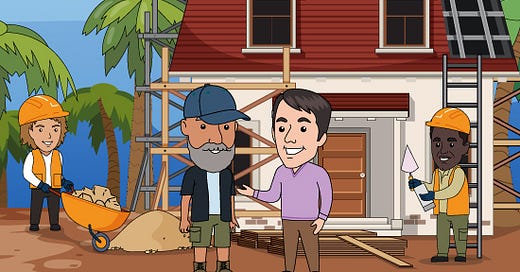Last year, I was invited to a brainstorming session on climate change with prominent environmental leaders and academics. Our specific angle: The 2024 election.
To my surprise, one of the academic superstars shared a bold forecast:
“First,” he said, “it’s extremely likely that there will be a catastrophic hurricane that badly damages the US in the months immediately before the election.”
His conviction about this matter caught me off guard. I decided to see what else he knew.
“Where exactly?” I asked.
“Florida,” he responded, with a certainty that spooked me.
Then he made a second prediction.
“The hurricane will be so severe that it will shock voters. Enough of them will change their minds and switch their vote to the candidate with the most credible climate program. And he will win.” (Of course, he had President Biden in mind).
I pushed back.
“We’ve had prior catastrophic events—Katrina, Sandy, disastrous forest fires, orange-tainted smoke-filled skies over NYC. Those didn’t seem to change what voters do.”
“This next one will be worse,” he said. “Watch out.”
Now, here we are.
You don’t need me to confirm he was right—at least about the weather prediction. Hurricane Helene wreaked havoc and destruction. And just as I was thinking he got the location slightly wrong, Helene was immediately followed by Milton barreling through Florida.
But will his second prediction come to pass?
On the one hand, the candidate who regularly declares climate change to be a “hoax” is staying true to form, attempting to divert voters’ attention with false claims about the federal government bungling relief efforts and blaming it on immigrants. We can only hope his supporters don’t fall for this nonsense.
Meanwhile, we haven’t yet seen how the Harris campaign will address these developments. As we discussed in our last issue, they’ve felt the need to proceed cautiously on anything related to climate—even though the Biden/Harris administration has done more than any other to address the climate emergency—because voter support for climate action is so tentative. Which is exactly why I continue to argue that environmentalists should prioritize reaching out to reasonable voters who are currently on the sidelines on this topic.
Readers have pressed for more specifics on how climate-concerned citizens should do this. So let me share a few ideas on what we should do between now and Election Day, as well as over the years ahead.
But first, I will note what I don’t have in mind.
Enviros are very good at discussing matters like this amongst themselves. Nothing wrong with that, but that’s not going to solve the challenge we’re addressing here.
Enviros are also pretty good at criticizing whomever they think are the bad guys. I have mixed feelings about the value of this strategy. But again, that’s not what I have in mind here.
Rather, I’m advocating that we reach out directly and specifically to citizens who don’t see the world the same way we do—including Republicans—to try to find common ground and build consensus for some action.
We should be talking on two fronts. First, the science (and reality) is now rather clear: with the amount of climate change that is already locked in, we should expect more frequent and more intense storms, just like Helene and Milton. So let’s seek out some agreement on how best to protect people and property in harm’s way.
Second, this is not as bad as it’s going to get. So how do we prioritize not locking in even worse outcomes? When Roy Vagelos, who is from the health sector, joined my Board at The Nature Conservancy and learned about our climate adaptation efforts, he said, “That reminds me of people who wanted to address HIV by building hospitals. It's helpful, but you're just going to keep building hospitals forever. Wouldn’t it be better to address the root cause, so there will be less people who need hospitals?.”
Of course, agreeing on the precise steps we should take for climate adaptation and mitigation is complex and contentious. But the likelihood for smoother progress increases when policymakers believe that a bipartisan majority (doesn’t have to be everyone) insists that we do our best to make progress now. One important signal would be a refusal to accept demagoguery that labels the climate crisis a hoax.
Further, we can push the organizations we support—environmental NGOs, corporations, universities, and places of worship—to pursue the same goal of building a bigger constituency demanding commonsense climate actions now.
Some of my friends in DC call me naive. Maybe so. Nevertheless, I’m confident progress can be achieved. Most people love their children and grandchildren and want to do everything they can to ensure that the future world will be a safe one for them and everyone else. And anyway, it would be folly for us not to try our hardest to pull this off.
Onward,





Yes, and thank you. Love your title. Conventional wisdom is that Dylan meant Hard Rain's lyrics to depict a nuclear holocaust but, as cryptic as he is, perhaps he meant it as a double entendre to include climate change?
It's unbelievable how forgetful we are about what happened last time: not only did hoaxer-in-chief pull us out of the Paris Accord, but he appointed fossil fuels lobbyists to run the EPA. And then dismantled dozens of environmental regulations including prevention of coal mountaintop mining (causing downstream water pollution in addition to more coal emissions), requirements for natural gas frackers to be careful about harmful methane emissions, and many more. Let's remember, and ponder how much worse it would be this time, given recent progress made, and vote for a cleaner planet and a more respectful interface between man and nature.